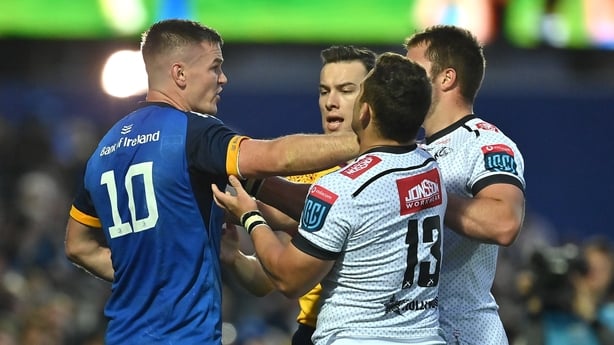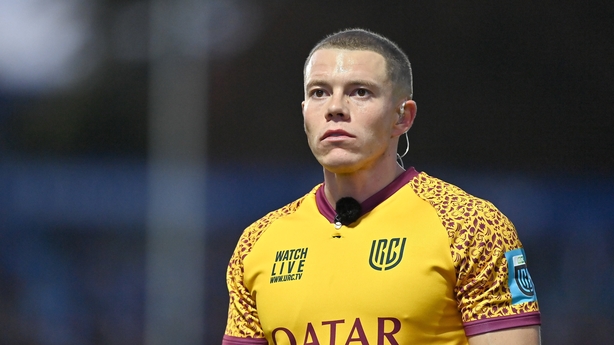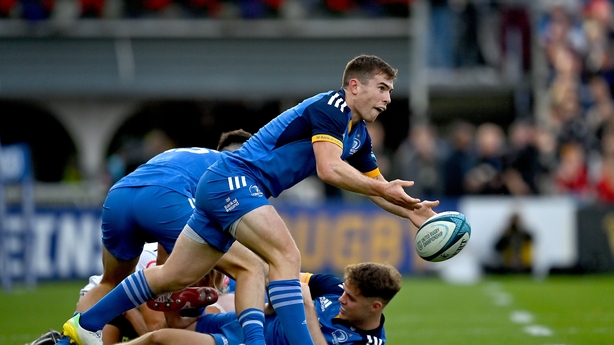The latest round of URC rugby gave us a number of talking points.
The Sharks travelled to Dublin without their international contingent and it was far and away the highest standard of all the matches played over the weekend. It was a bruising, competitive, high-scoring encounter that had a number of its own talking points throughout the game.
The most contentious issue across the 80 minutes, aside from the nasty head collisions on show, was Johnny Sexton's captaincy. Opinion is divided on whether Sexton crossed the line when speaking to referee Craig Evans.
Evans is a stern and dominant referee who lays down his perception of the law in an unremorseful demeaner. When a referee approaches the game this way, with little discussion around their decisions, they will be scrutinised a lot more than other more conversational referees.
From early on, Sexton had questions surrounding Evans’ approach. Maybe it was the tight game that he found himself in, and we know he’s a determined and competitive guy who will argue for every blade of grass around the pitch. However, there were a number of refereeing decisions that caused friction between Sexton and Evans.
As the captain, Sexton is entitled to have discussions with the referee. It is pretty much his job to get a handle on the way the game is being refereed and any good captain plays on the edge of the moral compass when striking up their own relationship with the referee.

It’s not always an amicable, two-way relationship. Often, the conversation can get heated from the beginning of a match to an irreparable point. This shouldn’t happen but for one reason or another it does.
Sexton had one or two heated exchanges with Evans because of penalty decisions at the breakdown that Sexton was directly involved in. Sexton was penalised for a side entry into a ruck, which was a tight enough decision. I could see from the referee’s perspective that Sexton engaged through the gate and almost walked around the side while dragging the opponent with him.
However, Sexton will argue that he engaged from the hind most foot and then tussled with an opposition player. The law states that you must enter from the hind most foot. Sexton did that. He wrestled in a way that he could remove the opposition player who had a physical advantage over him.
So no, he didn’t continue straight through the ruck but I’m not sure that’s what the law states. This is where interpretation of the law between a referee and the players can become a difficult situation as both sides can view the situation from differing lenses. All in all, this was disagreement number one.
The second real discussion was when Sexton missed his clear-out following some sublime attacking play on the short side of a scrum where Sexton ran blind with McGrath and kicked ahead for Ringrose who gathered and offloaded to Luke McGrath who copped a big hit.

When Sexton missed the clear out, Evans rewarded Kok with the poach penalty, but Sexton argued that the Sharks tackling player didn’t roll away and impeded the line that Sexton had into the ruck.
It all happened so quickly but I think this argument was borne out of frustration from Sexton, and if he looked back at it objectively he would probably concede that his action was in his own control and the penalty was a fair judgement.
The referee's interpretation of the breakdown is something that is very frustrating for me from a coaching perspective. As an attack-based coach, the breakdown is the gateway to fast ball and a superior attacking strategy. It can also be hugely disruptive to the quality of ball that you get. It is up to your player to sort out your own ball before relying on the referee, but the referee can have a major impact on the flow of any game.
Evans actually controlled the breakdown well for the majority of the game. He gave a penalty against openside, Richardson, for his body position while winning a turnover. Richardson had a very low body height when getting into an immovable position but, in my opinion, he wasn’t controlling his own body weight and his knees used the tackler to get so low.
If you look at most poach penalties, you could argue either way for how the poacher got into the position. Personally, I like to see the referee favouring the attacking team here, although I don’t want to take the reward away from the poacher either. It’s just an example of how Evans refereed the game to the laws and didn’t have a poor performance overall.
However, the incident that really broke the trust between captain and referee was the Ryan Baird incident where Abrahams made no attempt to play the ball and collided with Baird, who had jumped to compete with Chamberlain while the ball was in the air.
It was clumsy if anything from Abrahams, but he played Baird illegally, and what compounded this event was that Baird was forced off in a stretcher after a nasty looking collision.
In this instance, you could hear the discussion on the referee’s mic, and what struck me was how accurate Sexton was in his breakdown of the event. He knew which player it was and how he played Ryan Baird in a reckless way without competing for the ball.
Evans refused to check for himself on the big screen, which was a mistake. Again, there was no malice from Abrahams, but if we’re going to tidy up the nasty collisions and unnecessary head contacts in the game, then this was an incident that needed to be sanctioned.

Tempers flared again near the end of the game when Van Rensburg was shown a red card. Sexton was asked repeatedly to calm down in this instance because he was asserting a dominant tone over the referee.
You could argue that there was a line crossed here, but you can imagine that from his perspective, he lost one team-mate to an injury and he wasn’t going to let another high shot slide.
Van Rensburg could have received two different coloured cards in one phase of play. If Sexton doesn’t stand up for the safety of his players, and if the referee already let an incident slide, then who will hold the referee accountable? Apologising for a poor call after the incident is too late.
"Sexton has a lot of skin in the game at this stage of his career and should be afforded a conversation.
A player of Sexton’s quality with his experience and the high standards that he sets will always find it difficult when a referee is dismissive of their view on a situation.
The referee is the one in charge and I’m well aware of that. However, Sexton has a lot of skin in the game at this stage of his career and should be afforded a conversation. He shouldn’t get special treatment but we have seen captains through the years earn a different level of conversation from the referees.
We need to uphold a high level of refereeing and I’m especially in favour of any referee that can discuss a situation while getting their views across in a less dismissive way. If Evans chooses to use a less conversational and more personally detached style of refereeing, he must expect captains like Sexton to passionately defend their players’ safety.
Sexton is a captain and leader and while some may complain, I don’t think anyone that plays with him in green or blue would ask him to take a step back.
Watch Connacht v Leinster in the United Rugby Championship on Friday from 7pm on RTÉ2 and RTÉ Player, listen to live commentary on RTÉ Radio 1 Extra and follow a live blog on RTÉ.ie/sport and RTÉ News app


